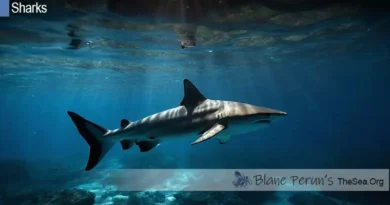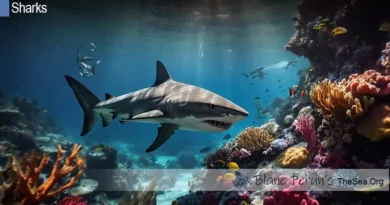Do Sharks Eat Manatees
Table of Contents
Do Sharks Eat Manatees? Unraveling the Interactions in Marine Ecosystems
When we think about the ocean, we often picture a vast, mysterious world where an array of creatures lives in complex, interconnected ecosystems. At the heart of these ecosystems are predator-prey relationships that maintain the delicate balance of marine life. Among the gentle giants of these waters are the manatees, known scientifically as Trichechus, which glide through warm coastal waters, grazing on plants with a peaceful demeanor. On the other hand, sharks, with their formidable reputation, roam the seas as apex predators. But does the path of the shark cross with that of the manatee? And if so, what does that interaction look like? Let’s dive into the intriguing relationship between sharks and manatees to understand more about their encounters beneath the waves.
Understanding Manatee Behavior and Habitats
Manatee Habitats: A Safe Haven?
Manatees, often referred to as sea cows, are predominantly herbivorous marine mammals that inhabit shallow, slow-moving rivers, bays, estuaries, and coastal areas. These areas are rich in seagrass beds and freshwater vegetation, which form the primary diet of manatees. The warm waters are crucial for manatees, especially Trichechus manatus, also known as the West Indian Manatee, as they have a low metabolic rate and minimal fat insulation. This makes them highly susceptible to cold stress, thus confining them to warm waters, which, coincidentally, are also favored by certain species of sharks.
Manatee Social Structure and Movement
Manatees are generally solitary creatures but are known to form loose aggregations in areas of high food abundance or warm water refuges. Their slow-moving, gentle nature might make them seem like easy targets, but manatees have a robust skeletal structure, especially their ribcage, which provides some protection against predators. Their movement patterns, which include long migrations in search of warm water or fresh feeding grounds, can potentially put them in the path of predatory sharks.
Shark Predatory Behavior and Diet Preferences
The Dietary Habits of Sharks
Sharks are often portrayed as the ultimate predators of the seas, with a diet that includes a wide range of marine animals, from fish and cephalopods to marine mammals like seals and dolphins. However, not all sharks are built the same. Species like the great white shark (Carcharodon carcharias) are known for their ability to take down large prey, but many shark species have diets that consist mainly of smaller fish and invertebrates. The question then arises, do manatees fit into the dietary preferences of any shark species?
Sharks and Opportunistic Feeding
One of the key characteristics of shark feeding behavior is opportunism. Sharks are adept at exploiting available food resources, and their diet can be quite varied based on what’s accessible. While large sharks might occasionally encounter manatees, such interactions are rare and not well-documented. It’s essential to understand that while sharks are capable predators, they tend to prefer prey that requires less energy to catch, which might not always include the large, robust manatees.
The Reality of Shark-Manatee Interactions
Documented Cases and Observations
When it comes to direct interactions between sharks and manatees, documented cases are few and far between. This scarcity of information could be due to the elusive nature of these encounters or the possibility that such events are rare. Researchers have observed scars and wounds on manatees that could be attributed to shark bites, but definitive evidence linking these injuries to predatory attacks is limited. It’s more plausible that most of these interactions are non-predatory in nature, possibly exploratory bites by sharks, rather than attempts to prey on manatees.
Analyzing the Risk Factors
Given the manatee’s size, robustness, and habitat preferences, the risk of predation by sharks remains low. Manatees’ primary threats are human-related, including boat strikes and habitat degradation. In the rare instances where sharks and manatees do interact, it’s likely more a case of curiosity or mistaken identity rather than a predatory attack. The slow, gentle nature of manatees and their tendency to stay in shallow, vegetated waters also reduce the likelihood of frequent encounters with large, predatory sharks.
Conclusion
The interaction between sharks and manatees is a topic shrouded in mystery, with limited documented cases to draw from. While the possibility of sharks preying on manatees cannot be entirely dismissed, the evidence suggests that such events are rare. The habitats and behaviors of manatees, coupled with the dietary preferences and feeding behaviors of sharks, make significant interactions between the two unlikely. In the vast, interconnected marine ecosystem, the paths of sharks and manatees do cross, but not in the way we might expect. Instead of predator and prey, they are co-inhabitants of the marine world, each playing a role in the delicate balance of oceanic life.
FAQs on Sharks and Manatees
Do sharks actively hunt manatees? Sharks do not actively hunt manatees. While sharks are opportunistic predators, manatees are large, have a robust build, and typically inhabit shallow waters, which aren’t the preferred hunting grounds for large predatory sharks. Most interactions between sharks and manatees are likely incidental rather than predatory.
Can a manatee defend itself against a shark? Manatees are not aggressive animals and do not have significant physical defense mechanisms against predators. However, their large size and thick skin can provide some protection. Additionally, their habitats in shallow, vegetated waters may offer some safety from large shark species.
Have there been any recorded attacks of sharks on manatees? There have been very few documented instances of shark attacks on manatees, and it’s challenging to ascertain the nature of these interactions. Some manatees have been observed with injuries that could be attributed to shark bites, but these are not necessarily indicative of predatory attacks.
What factors might lead to a shark attacking a manatee? On the rare occasions where a shark might attack a manatee, it could be due to mistaken identity, particularly in murky waters, or a young, inexperienced shark exploring potential food items. However, such instances are considered to be exceedingly rare.
How do manatees generally avoid predators like sharks? Manatees primarily rely on their habitat for protection. They tend to stay in shallow, vegetated waters where large sharks are less likely to venture. Their slow movements and quiet grazing do not typically attract the attention of predators, helping them avoid encounters with sharks.



